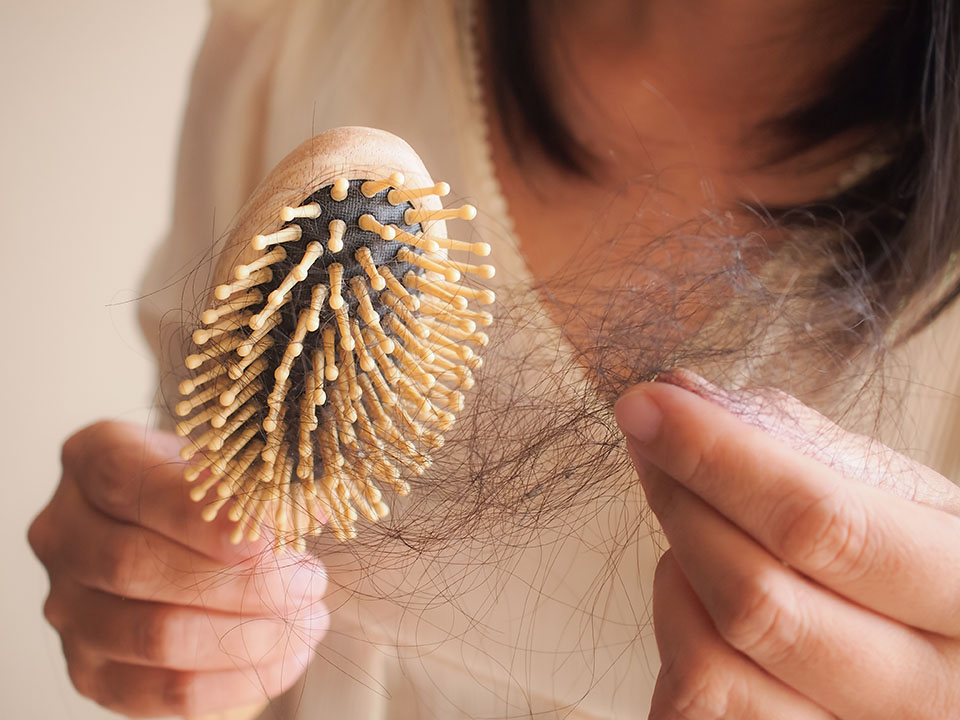 As women, we can be our own worst critics and constantly fret about our appearance.
As women, we can be our own worst critics and constantly fret about our appearance.
We’re already affected by the changes in our bodies as we age, but the onset of hair loss is particularly debilitating.
If your hair starts falling out, it can be extremely upsetting — especially when you don’t know the cause. And it can affect your self-esteem and well-being.
Hair loss in women can have many causes. And sometimes, it’s not a single cause, which can make it even more difficult to deal with.
You may notice that your hair falls out after a stressful event; however, this usually happens a few months after the event. And while stress is a cause that we can readily recognize and accept (because the hair will grow back), other causes that may not be as obvious. This includes thyroid problems, vitamin and mineral deficiencies, or other hormonal imbalances.
Regardless of the cause, it is very upsetting to find clumps of hair falling out, parts widening, or even worse, bald spots emerging.
Now for the Good News: Dr. Wood Can Help!
While hair loss can feel overwhelming and confusing, you do not have to figure it out on your own! Dr. Wood and the amazing staff at Wonderfully Made Functional Medicine are here to help you.
You don’t have to live with unwanted hair loss and accept that it’s just the way it’s going to be. We will work to find the underlying causes of hair loss and treat them accordingly.
New Patients Call: 972-214-5641
Causes of Hair Loss
 One of the most common causes of hair loss is a thyroid problem. A thyroid disorder can cause hair to fall out for several reasons.
One of the most common causes of hair loss is a thyroid problem. A thyroid disorder can cause hair to fall out for several reasons.
The thyroid is known as the “master gland.” It regulates your metabolism, hormones, and other physiological processes. A sluggish thyroid, called hypothyroidism, causes your metabolism to slow down. That means energy isn’t readily available to all the biological processes that depend on it, including hair growth.
Hypothyroidism can also cause your digestive system to slow down, which can impede the absorption of vitamins and minerals such as iron. Iron is critical for hemoglobin in red blood cells, which carry oxygen — and when not enough oxygen is delivered to hair follicles, this can also lead to hair loss.
The thyroid is a major player in our body’s synchronized endocrine system, which comprises many glands that produce hormones.
When a woman reaches her perimenopausal/menopausal years, hormone levels decline and can contribute to hair loss. In fact, imbalanced hormones are the most common cause of hair loss for middle-aged women.
Female hormone production begins to decrease as women reach their forties and fifties and can not only cause hair to fall out, but can also cause changes in texture, such as dryness or brittleness. Hair can become thinner and finer, and the scalp can become itchy and dryer.
Hormone imbalances that can contribute to hair loss:
Estrogen deficiency
Too little or too much testosterone production
Progesterone deficiency
Adrenal fatigue (low cortisol levels)
Insulin resistance
Other causes of hair loss in women:
Sudden stress, such as divorce or death
Chronic stress
Poor diet
Significant weight loss
Auto-immune disorders
Iron deficiency
Low B vitamin levels
Some medications
Nutritional deficiencies
Supplements that can help with hair issues:
Biotin
Iron (taken only under a doctor’s supervision)
Selenium
Zinc
B-complex
Magnesium
Iodine (taken only under a doctor’s supervision)
Vitamin D3
Because hormones are the chemical messengers that send signals throughout your body, any imbalance in the endocrine system can cause a cascade effect where other hormones are thrown off.
This is why it’s important to explore ALL potential root causes: If you are only addressing one particular problem, you aren’t correcting the whole.
Dr. Wood begins her care by spending time getting to know YOU, your history, and your lifestyle. She will also run a very comprehensive set of labs to help determine the root causes of your hair loss. And finally, she will work with you to restore your body’s natural function as it was designed.
Contact our New Patient Coordinator
To start your road to recovery, contact our New Patient Coordinator today. She will answer any questions you have and explain our treatment protocols, fees, and options.
You can also fill out the form below, and we will contact you at a time that is convenient.
New Patients Call: 972-214-5641
Contact Us
Contact Us by filling in the form below.
